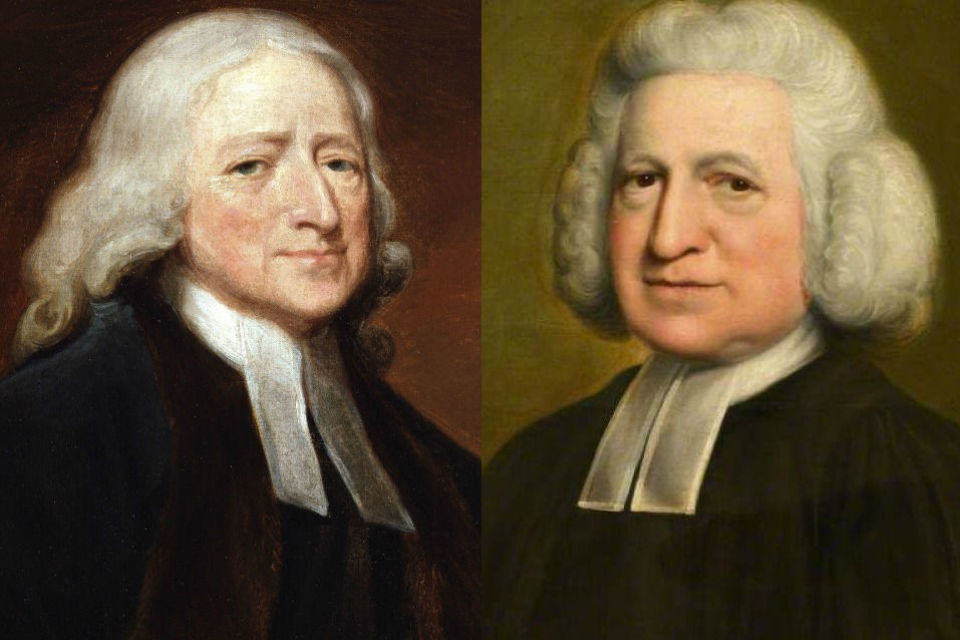These are difficult days for United Methodists. Despite glowing optimism flowing from the 2024 General Conference, astute observers are concerned.
We have lost some of our best churches and members through disaffiliation. The non-American membership, now more numerous than the American membership, is presently debating its own forms of disaffiliation and that is not always going well. There is a question whether the idea of regionalization can work, or, for that matter, will even be approved by various conferences.
Denominational budgets are being cut. Parachurch ministries like the Gideons are cutting official ties with United Methodists. The Social Principles statement passed by the General Conference has moved the church away from traditional morality, especially in regard to matters such as the family and human sexuality.
Still, some of us who identify as evangelical or traditionalist and still hold our connection as UM continue to hold out hope. While there are various reasons for this, this article lifts up one reason: our United Methodist hymnal. It is worth noting that among all the reasons given why numbers of churches and persons no longer wish to be identified as United Methodist, almost none (I don’t know of any) mention the hymnal as a reason for disenchantment.
I start this article by going back a number of years.
“Wesley wasn’t always right on the atonement.” These are the words as I recall them spoken during the discussion in the Language and Theology Subcommittee of the Hymnal Revision Committee for the new UM Hymnal approved in 1988. The words were spoken by a well-known theologian of one of our UM seminaries during a discussion on Wesley’s hymn, “Arise, My Soul, Arise” (1964 hymnal, #122).
Arise, my soul, arise; Shake off thy guilty fears; The bleeding sacrifice, In my behalf appears
Before the throne my Surety stands, …my name is written on his hands.
Five bleeding wounds He bears, Received on Calvary; They pour effectual prayers; They strongly plead for me: “Forgive him, O forgive,” they cry, “Nor let the ransomed sinner die.” (vs. 3)
My God is reconciled; His pardoning voice I hear; He owns me for Hs child, I can no longer fear;
With confidence I now draw nigh,…and “Father, Abba, Father,” cry. (vs. 5).
The hymn had been a major part of the Charles Wesley corpus of Methodist hymns from the very earliest days of Methodism. It was popular in earliest Methodist hymnody, especially on the American frontier where a version was set to a fugue arrangement. It would seem a hymn too popular and too embedded in our Methodist ethos to be challenged. Even the most liberal of all the American Methodist hymnals, the 1935 hymnal, carried this (and other atonement hymns) in an unaltered form. These hymns not only reflected but affirmed and proclaimed the Wesleyan message, as set forth in the Articles of Religion and the sermons. This included the idea not only that we are reconciled to God, but that God is reconciled to us.
….whereof is one Christ, very God and very Man, who truly suffered, was crucified, dead, and buried, to reconcile his Father to us, and to be a sacrifice, not only for original guilt, but also for the actual sins of men. (Article II, Articles of Religion of the Methodist Church).
Despite the professor’s arguments the hymn was approved for use in the new hymnal. Then, mysteriously, several months later, the hymn was not listed among the approved hymns. I contacted Carlton Young, the editor of the hymnal, to inquire. He assured me the hymn had not been dropped. But, for mysterious reasons, and without mention in any of the committee’s minutes, when the final report was made to the General Conference, the hymn was not included and does not appear in the 1988 hymnal.
Despite the victories that progressive UMs claim in the development of the present UM Church, the truth is that, as we have been told many times, United Methodism is, at least on paper, committed to classical Methodist doctrine. Regardless of how radical the present Social Principles statements are, we have not changed our doctrinal standards. This includes all of Wesley’s writings and sermons on the atonement. It also includes all of Charles Wesley’s atonement hymns, such as: “And Can It Be that I should gain an interest in the Savior’s blood?” Or, “We who in Christ believe that he for us hath died, we all his unknown peace receive and feel his blood applied” (#372). Or, “O Love divine, what hast thou done! The immortal God hath died for me! The Father’s co-eternal Son bore all my sins upon the tree.” (#287)
The biggest challenge to Wesleyan theology and the Methodist message today is not just Calvinism but theology compromised by progressive thinking. When I was in conversation with editors of Curriculum Resources as a part of Good News some years ago, I remember the thought expressed that “Wesley was too ‘Augustinian’ and was simply wrong on his beliefs on Original Sin and the Atonement.”
What then do we do with the fact that in our present UM hymnal there are 80 some different hymns that refer to the blood of Jesus? When I was a part of the Hymnal Revision Committee I kept track of how “blood” was doing. For whatever it is worth, there is more “blood” in our 1988 hymnal than in any of the other official hymnals of the 20th century. Instead of excising the blood hymns we even added a few more such as “What can wash away my sin? Nothing but that blood of Jesus.” (#362) Thanks to Wesley and the American (mostly Methodist-inspired) gospel hymns, blood in our hymnal flows, is poured, is sprinkled and is found in fountains, rivers and streams. The hymnal even carries the hymn that was #1 in most of the early camp meeting hymnals (“There is a Fountain Filled with Blood”).
Methodists, along with Baptists, were responsible for redefining the word “evangelical” in the American context. As reflected in older dictionaries, evangelical” is a form of Protestantism which emphasized the sinfulness of humanity, the atonement of Christ, and salvation by faith, as practiced by Methodists and Baptists. (See Thorndike Barnhart Comprehensive Desk Dictionary, 1958). We should not blame Baptists but Methodists (at least originally) if there was an overemphasis on blood in American religion. Thus there are more Methodist writers of hymns in the older Southern Baptist hymnals than there are Baptists writers (there are also more Anglican hymn writers than Methodists in the UM hymnals.) All of this is related to Methodism’s introduction of camp meetings, the altar call, and gospel hymns.
This helps to explain why progressive theology is so obsessed with its rejection of evangelical theology. Some time ago a group of United Church of Christ women clergy put out a list of The Ten Worst Things About Christianity. Number one was “Washed in the blood of the lamb” theology, evident in many old hymns. Number two was Surrogate theologies of atonement in which someone (Jesus) must die for me to be right.
Some time ago the Christian Century featured an article by Daniel M. Bell, Jr., entitled “God Does Not Require Blood.” As suggested by the title the author is opposed not only to the substitutionary theory of the atonement, but any doctrine of the atonement that has blood as a key element. Reacting to the most crass and extreme expressions of suffering and substitution, Bell links the blood stuff with violence, war, spousal abuse, primitive views of justice, and all sorts of bad things. The author grants that the easiest way to circumvent the argument for any sort of blood atonement is simply to reject the cross but there are problems with that, not the least being that we would have to do something with all those crosses on our churches.
Bell, and almost all of the progressive theologians, posit a rather convoluted theory of atonement which ends up with another variation of the Moral Influence Theory in which Jesus is “faithfulness to the embodiment of God’s faithfulness to the divine desire for communion” (whatever that means).
Bell and his kind would do well to check out some Scriptures: “For the preaching of the cross is foolishness to those who are perishing but to those who are called…Christ the power of God” (I Cor. 1:18). “For I delivered to you as of first importance what I also received, that Christ died for our sins in accordance with the scriptures” (I Cor. 15:1). “Since all have sinned and fall short of the glory of God, they are justified by his grace as a gift, through the redemption which is in Christ Jesus, whom God put forward as an expiation by his blood, to be received by faith.” (Romans 3:24, 25)
In most of the Methodist world, which by this time includes the wider family of charismatics and Pentecostals and many non-denominational churches, this still holds true. It is not so certain for present-day United Methodists, for which the idea of the blood atonement as the core of our doctrinal heritage seems, if not outright rejected, to be deemphasized. I refer not to ordinary UMs but primarily to some persons in the episcopacy, in boards and agencies and in seminaries. As we pass through the trauma of change because of such things as the leftward lurch of our newly approved Social Principles statement, let us be clear where we stand not just on Wesleyan theology, but on classic Christianity.
One more item to add. While many churches now identify as part of the Global Methodist Church but still use the UM hymnal (possibly with “United” blotted out), other Global Methodists are adopting the brand-new hymnal, “Our Great Redeemer’s Praise,” published by Seedbed and specifically designed for Wesleyan-related groups. The last UM church I served, now ConneXion Church in Kokomo, IN, is even now switching to this new hymnal. Overall, this is an excellent hymnal. One of the first things I did when I received my copy was to check on whether one of my favorite hymns was included, “Cleansing Wave,” by the great Phoebe Palmer, which has about as much blood as anyone can handle. It is included (#488) in the Seedbed book, as well as many other holiness hymns.
However, as it relates to the present article, I must admit to some sorrow when I checked “Arise, My Soul Arise” (#535), which with the change of one word I believe has compromised and illustrates the matter under discussion. Instead of Wesley’s traditional wording which climaxes the message of the hymn in v. 5, “My God is reconciled,” the Great Redeemer’s verse reads, “to God I’m reconciled.”
We still need conversation about these things.
Riley B. Case is a retired United Methodist clergy member of the Indiana Conference.






Comment by Gary Bebop on August 21, 2024 at 12:39 pm
As Peter Hitchens has aptly noted in a blog piece for The Lamp Magazine, the past is being erased. I’m grateful for Riley Case’s crusade for memory of the church. But because so much of our past has already been erased and conventions turned upside down, there will be few who will understand Riley’s mission. It will seem to them quixotic.
Comment by MikeB on August 21, 2024 at 7:39 pm
Those hymns still echo in my mind, even as they were sung many years ago.
I wish you luck that you hold the line on the inevitable changes to the hymnal.
Every true hymn you hold will be another light shining out to the darkness. A witness that once men and women knew God, and worshiped Him without reserve.
Comment by PFSchaffner on August 21, 2024 at 9:53 pm
There may have been a time when churches were the vehicles of tradition; individuals came and went but the church could be counted on to remember, and to abide. Now the situation is often reversed: churches change, are transformed, and even disappear more quickly than people do. An individual commonly passes through several churches, and several more iterations of those churches, within a single lifetime. My wife and I have by now been members of three or four congregations that actually collapsed — ceased to exist — and denominations are scarcely more permanent. They are if anything more volatile. I think this reverses the old expectations about church membership and institutional continuity. It is now up to individuals and families to keep the flame alive, remember those hymns, sing their original words (and look them up if they have to — we always ignore the hymn books and sing the original text regardless), and carry them from church to church.
Comment by Roger on August 22, 2024 at 4:29 pm
Thank you for this Article. Many Methodist today, do not know why they are Methodist. I appreciate the the back gound for the songs you have written about. I Think a new Hymnal was to be done in 1984, and it got side tracked, Many Lay people had presented songs to be in it and some were selected. I wrote a person on the committee for the 1988 Hymnal to use the pre-selected songs for inclusion in the 1988 Hymnal. I got a quirk reply back, that the committee was going to start back over with all new selections. Thanks again for this article and background on Wesleyan songs.
Comment by James Culberson on August 23, 2024 at 7:05 pm
The hierarchy of the umc for decades has chosen to ignore the “blood sacrifice” that the Savior paid for OUR sins. It became (perhaps never was) unfashionable to mention “the blood sacrifice” from umc pulpits. After all, blood is messy……………………….
Comment by Tim Ware on August 23, 2024 at 10:40 pm
There is no need for conversation about anything in the UMC. It is a dying denomination in a dying society.
Comment by David Gingrich on August 27, 2024 at 7:19 am
Satan uses arrogant theology to divide Christ’s Church.